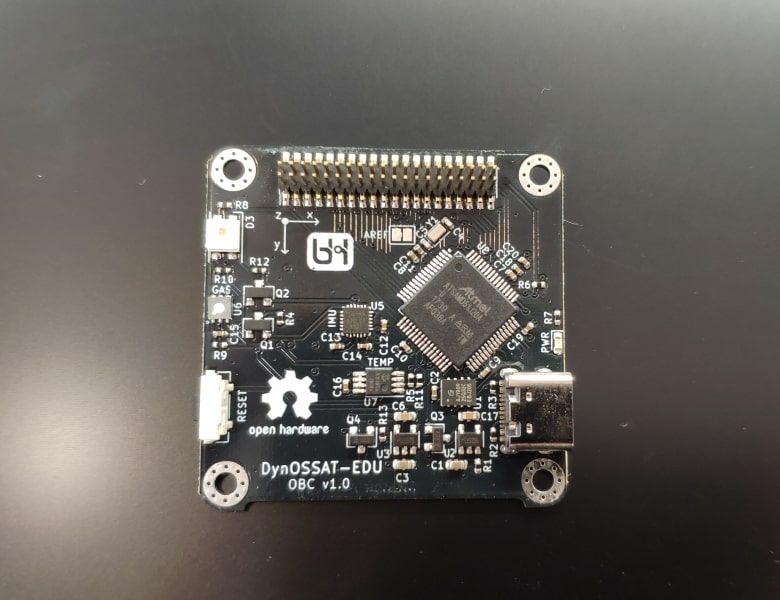
DynOSSAT-EDU OBC by BH Dynamics
DynOSSAT-EDU is the first open source PocketQube educational kit compatible with CircuitPython and Arduino.
This plaform is equipped with all the necessary modules for the operation of a nanosatellite (PocketQube) in Low Earth Orbit (LEO) that would serve as a device for teaching, training, and driving curiosity about the philosophy and technology related to NewSpace.
This is the On-Board Computer (OBC), the module responsible for managing the satellite and process sensor data. It integrates a 9-axis IMU, a gas sensor, a temperature sensor and carries a powerful ATSAMD51.
Hardware is licensed under CERN OHL v1.2.
Technical details
- Powerful ATSAMD51J20A-AU 120 MHz Cortex-M4F processor with 1 MB flash + 256 KB RAM for all your CircuitPython needs
- 32 Mbit SPI flash for storing CircuitPython code and libraries
- High-precision ICM-20948 Inertial Measurement Unit including Accelerometer, Gyroscope and Magnetometer for Attitude management
- MCP9808 Digital Temperature Sensor
- SGP30 TVOC and eqCO2 air quality sensor
- User-controllable WS2812B addressable RGB LED
- Separate 5V and 3.3V rails, providing up to 1A/500mA respectively
- MicroSD Card slot
- Female USB-C 2.0 connector for power and data logging
- PQBH40 bus exposing 10 digital pins, 6 analog pins (+ true DAC), an I2C bus, an SPI bus and an UART
- Comes preprogrammed with the UF2 bootloader and CircuitPython 6.0.0
Documentation
This board is open source hardware. You can check the docs and contribute here.
Purchase
Contribute
Have some info to add for this board? Edit the source for this page here.
CircuitPython 9.2.8
This is the latest stable release of CircuitPython that will work with the DynOSSAT-EDU OBC. Use this release if you are new to CircuitPython.
Modules included in this download
_asyncio _bleio _pixelmap adafruit_bus_device adafruit_pixelbuf aesio alarm analogio array atexit audiobusio audiocore audioio audiomixer audiomp3 binascii bitbangio bitmaptools board builtins builtins.pow3 busdisplay busio busio.SPI busio.UART codeop collections countio digitalio displayio epaperdisplay errno floppyio fontio fourwire framebufferio frequencyio getpass gifio i2cdisplaybus i2ctarget io jpegio json keypad keypad.KeyMatrix keypad.Keys keypad.ShiftRegisterKeys locale math max3421e microcontroller msgpack neopixel_write nvm onewireio os os.getenv paralleldisplaybus ps2io pulseio pwmio rainbowio random re rgbmatrix rotaryio rtc samd sdcardio select sharpdisplay spitarget storage struct supervisor synthio sys terminalio tilepalettemapper time touchio traceback ulab usb usb_cdc usb_hid usb_midi vectorio warnings watchdog zlibFeatures: USB-C
CircuitPython 10.0.0-beta.0
This is the latest development release of CircuitPython that will work with the DynOSSAT-EDU OBC.
Alpha development releases are early releases. They are unfinished, are likely to have bugs, and the features they provide may change. Beta releases may have some bugs and unfinished features, but should be suitable for many uses. A Release Candidate (rc) release is considered done and will become the next stable release, assuming no further issues are found.
Please try alpha, beta, and rc releases if you are able. Your testing is invaluable: it helps us uncover and find issues quickly.
Release Notes for 10.0.0-beta.0
Modules included in this download
_asyncio _bleio _bleio (HCI co-processor) _pixelmap adafruit_bus_device adafruit_pixelbuf aesio alarm analogio array atexit audiobusio audiocore audioio audiomixer audiomp3 binascii bitbangio bitmaptools board builtins builtins.pow3 busdisplay busio busio.SPI busio.UART codeop collections countio digitalio displayio epaperdisplay errno floppyio fontio fourwire framebufferio frequencyio getpass gifio i2cdisplaybus i2ctarget io jpegio json keypad keypad.KeyMatrix keypad.Keys keypad.ShiftRegisterKeys locale math max3421e microcontroller msgpack neopixel_write nvm onewireio os os.getenv paralleldisplaybus ps2io pulseio pwmio rainbowio random re rgbmatrix rotaryio rtc samd sdcardio select sharpdisplay spitarget storage struct supervisor synthio sys terminalio tilepalettemapper time touchio traceback ulab usb usb_cdc usb_hid usb_midi vectorio warnings watchdog zlibFeatures: USB-C
Absolute Newest
Every time we commit new code to CircuitPython we automatically build binaries for each board and language. The binaries are stored on Amazon S3, organized by board, and then by language. These releases are even newer than the development release listed above. Try them if you want the absolute latest and are feeling daring or want to see if a problem has been fixed.
Previous Versions of CircuitPython
All previous releases of CircuitPython are available for download from Amazon S3 through the button below. For very old releases, look in the OLD/ folder for each board. Release notes for each release are available at GitHub button below.
Older releases are useful for testing if you something appears to be broken in a newer release but used to work, or if you have older code that depends on features only available in an older release. Otherwise we recommend using the latest stable release.
